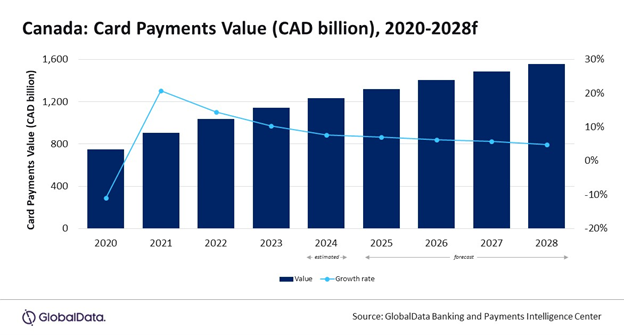
Canada’s card payments market is forecast to grow by 7.7% in 2024 to reach CAD1.2 trn ($913bn), supported by high consumer preference for electronic payments, according to GlobalData, publishers
GlobalData’s Payment Cards Analytics reveals that card payment value in Canada registered a growth of 14.4% in 2022, driven by a rise in consumer spending. However, the value registered a slightly slower growth of 10.4% in 2023 to reach CAD1.1 trn ($847.8bn), on account of slowdown in economy.

US Tariffs are shifting - will you react or anticipate?
Don’t let policy changes catch you off guard. Stay proactive with real-time data and expert analysis.
By GlobalDataYasaswini Pujitha, Banking and Payments Analyst at GlobalData, commented: “The Canadian payment card market is mature with high level of card adoption, developed payment infrastructure and boarder merchant acceptance. With a nearly 100% of banking population and a well-established framework for accepting multiple payment methods, making it one of the most advanced card markets both regionally and globally.
“The reduction of merchant interchange fees by the government, coupled with banks offering value-added services such as discounts and rewards on card payments, has further decreased consumers’ dependence on cash. The rising preference for contactless payments and growth in e-Commerce are expected to further boost card payments.”

Credit and charge card cards lead the Canadian payment card market
They are accounting for 74.4% of the total the card payment value in 2024. Banks in the country are offering various value-added benefits to increase the use of credit cards, such as rewards, discounts, and cashback.
Debit cards account for 25.6% of the total card payment value in 2024. However, debit cards are more frequently used for low-value day-to-day payments, with annual debit card payment frequency in Canada standing at 221.3 transactions per card in 2024, up from 174.3 transactions per card in 2020. This is mainly due to their broader merchant acceptance, convenience, and security.
The cap on interchange fee also encouraged merchants to accept card payments, thereby promoting the use of card transactions. The increasing use of debit card is supported by marginal, or no interchange fee associated with domestic debit card scheme Interac.
In case of credit cards, in July 2020, Visa reduced interchange fees on credit cards to an average annual rate of 1.4%, down from 1.5%. Mastercard made the same change in August 2020. Meanwhile, in December 2023, the Canadian government negotiated agreements with Visa and Mastercard to reduce interchange fees for small businesses. The credit card interchange fees for in-store transactions will be capped at an average of 0.95%.
Businesses with an annual Visa sales turnover of less than CAD300,000 ($222,305.5) will be eligible for lower interchange fees, while those with annual Mastercard sales turnover of below CAD175,000 ($129,678.2) will qualify for lower fees from Mastercard. The new rates will come into effect in Q3 2024.
The rising adoption of contactless card has also been a key driver of card-based payments, especially for low-value, day-so-day transactions. According to Payments Canada’s Canadian Payment Methods and Trends Report 2023, Canadians made 7.5 billion contactless transactions of value CAD379.7bn ($281.4bn) in 2022, up from 4.5 billion transactions of transaction value CAD184 bn ($136.3bn) in 2018.
Pujitha concluded: “Although the economic slowdown continues to pose some challenges in the short run, the Canadian card payments market is expected to continue its growth trajectory, registering a compound annual growth rate (CAGR) of 6.0% between 2024 and 2028 to reach CAD1.6 trn ($1.2trn) in 2028, supported by high consumer preference for electronic payments, well-developed payments infrastructure and expected reduction in credit card interchange fees.”








